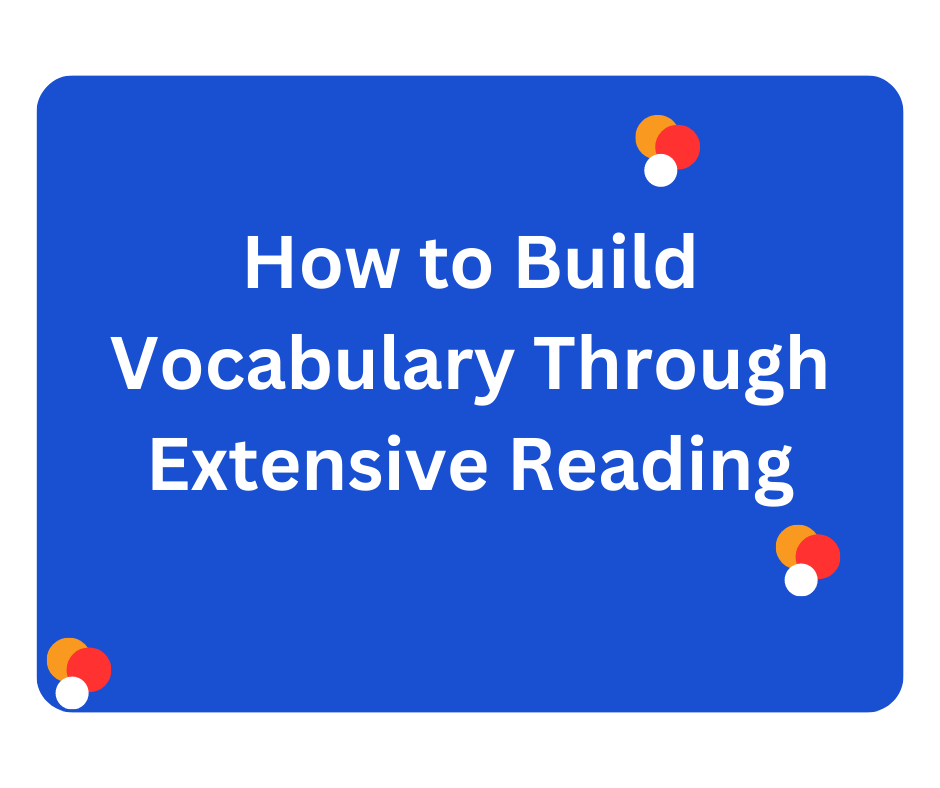Building a strong vocabulary is essential for effective communication in any language. One of the most effective ways to expand your vocabulary is through extensive reading. In this blog post, we will explore practical strategies to help you build your vocabulary through extensive reading, enabling you to enhance your language skills and become a more proficient English speaker.
- Choose the Right Material: Select reading materials that match your current proficiency level. Start with books, articles, or stories that are slightly challenging but still understandable. This allows you to encounter new words and phrases while maintaining comprehension. Gradually increase the difficulty level as your vocabulary grows.
- Contextual Understanding: Focus on understanding the meaning of words through context rather than relying solely on dictionaries. Try to guess the meaning of unfamiliar words based on the surrounding sentences or paragraphs. This method helps you develop the skill of inferring word meanings, which is crucial for effective communication.
- Keep a Vocabulary Journal: Maintain a dedicated vocabulary journal or use digital tools to record new words and their definitions as you encounter them during reading. Include example sentences or phrases to understand how the words are used in context. Regularly review your vocabulary journal to reinforce your learning.
- Use a Dictionary Selectively: While it’s important not to rely solely on dictionaries, they can be valuable tools for deeper understanding. Look up words that you encounter repeatedly or those that hinder your comprehension. Use a learner’s dictionary or online resources that provide definitions, example sentences, and pronunciation guides.
- Create Flashcards: Convert your vocabulary journal entries into flashcards for efficient review. Include the word, its definition, example sentences, and any additional information that helps you remember the word. Use spaced repetition techniques, reviewing the flashcards at regular intervals, to reinforce your learning and retention.
- Practice Active Reading: Engage actively while reading by highlighting or underlining new words and phrases. This helps you focus on and remember key vocabulary. After reading a section or chapter, review the highlighted words and their definitions. Use them in your own sentences to reinforce understanding and usage.
- Join a Book Club or Reading Group: Participate in a book club or reading group where you can discuss the books you read. Engaging in discussions with others allows you to practice using new vocabulary in a meaningful context. It also provides an opportunity to learn from others’ interpretations and insights.
- Use Vocabulary in Writing and Speaking: Apply the new vocabulary you’ve learned in your writing and speaking practice. Incorporate the words and phrases into your essays, emails, or conversations with language exchange partners. Actively using vocabulary in real-life situations helps solidify your understanding and makes the words a part of your active vocabulary.
- Read Widely: Explore a variety of genres, such as fiction, non-fiction, newspapers, magazines, and online articles. This exposes you to different writing styles, topics, and vocabulary. Reading from diverse sources broadens your vocabulary repertoire and improves your overall language proficiency.
- Maintain a Reading Routine: Consistency is key when building vocabulary through extensive reading. Set aside dedicated time each day or week for reading. Establishing a reading routine helps you stay motivated, ensures regular exposure to new words, and allows for gradual vocabulary growth.
Conclusion:
Extensive reading is a powerful tool for vocabulary development. By selecting appropriate reading materials, focusing on contextual understanding, maintaining a vocabulary journal, using dictionaries selectively, creating flashcards, practicing active reading, joining book clubs or reading groups, applying vocabulary in writing and speaking, reading widely, and maintaining a reading routine, you can effectively build your vocabulary and enhance your English language skills. Embrace the joy of reading and watch your vocabulary expand, enabling you to express yourself more confidently and fluently in English.
